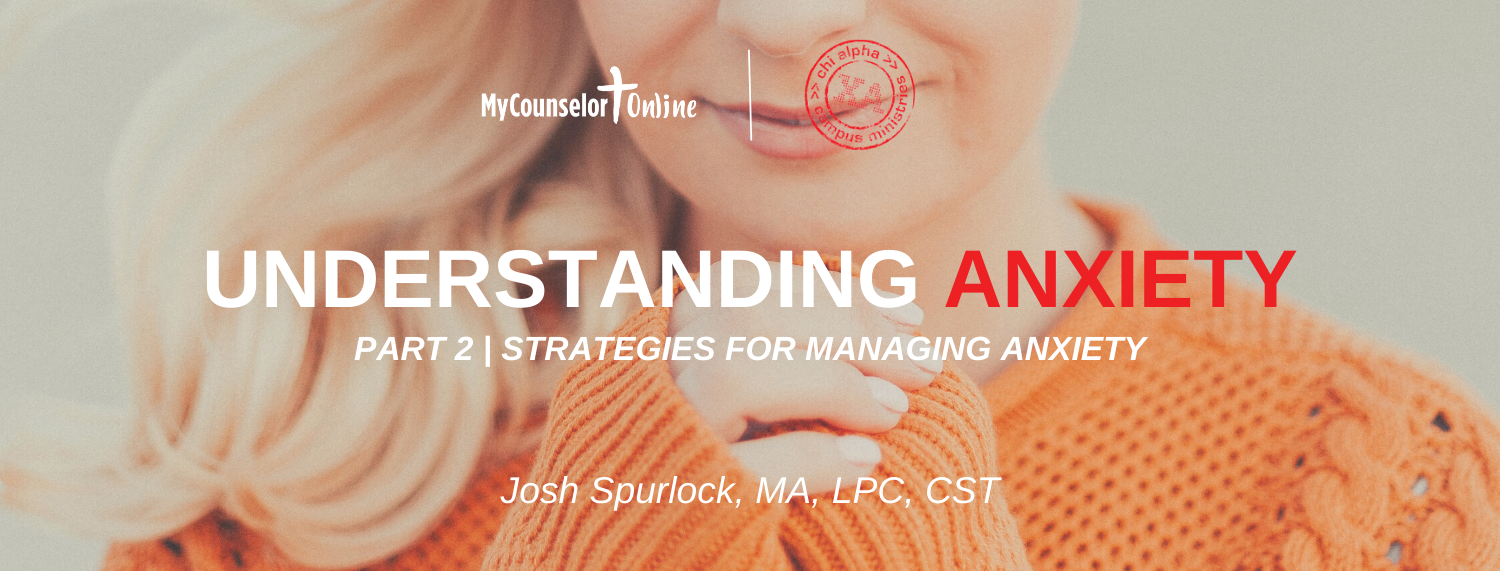In Understanding Anxiety Part 1, we talked about what anxiety is, and why we experience it. Now, let’s take a look at what you can do if you’re struggling with anxiety.
Here are healthy coping mechanisms you can try to ease anxiety and identify the story you’re telling yourself:
- Step Back & Breathe: Find a place where you can step away and calm your mind. Take deep, stomach-filling breaths, in through your nose and out through your mouth. As you do this, your brain signals to your body that it doesn’t need to be on high alert, and your body begins to calm down.
- Ask Questions: By asking reflective questions, we can bring to our awareness those unconscious stories we’re telling ourselves. That can look like this:
- Pray and ask the Holy Spirit to help you identify what’s going on in your heart.
- Ask questions like these:
- What am I feeling?
- What are the facts?
- What did I see or hear immediately prior to feeling what I’m feeling?
- Question Your Story: Remember how your brain tells you a story about what’s happening, base on your past experiences? We have the power to interrupt this story-assigning reflex by considering an alternative story. In doing so, we interrupt the emotional reaction that the default story was producing, and are able to change our perspective. That may look like considering:
- Is it possible there are other explanations for this situation? What might they be?
- Hypothetically speaking, why might a reasonable, rationale, and decent human being respond the way this person is?
- Decatastrophize: Some things we experience are catastrophic, and others are not. The labels we place on situations in our story matter. Change the label, change the emotional response. This starts by identifying the intense label you have applied to a situation, and choose to replace it with a less intense label that is more accurate to the situation, and consistent with the Truth of God’s Word.
Developing healthy coping mechanisms is so important to mastering anxiety. However, the effectiveness of these tips at eliminating anxiety will vary depending on the person. How we experience anxiety is influenced by our genetics. Some people are biologically predisposed to be more sensitive to anxiety while others are less. Depending on how severe the anxiety and how much biology is influencing, medication may be the only way to bring anxiety into normal ranges.
There can also be a spiritual component to our anxiety.
The enemy uses shame to make us feel condemned and separated from God, trying to convince us that we are unacceptable to God and unworthy to live in His Kingdom. When we believe this, we put on a mask, and disengage from life with God.
On the other hand, the Holy Spirit uses conviction to bring us to repentance and growth.
How can we tell the difference between the work of the enemy and the work of the Holy Spirit in our lives?
- You will never be worthy.
- If your Christian friends knew how you struggle with sin, they would reject you.
- God is so disappointed with you. You disgust Him.
- You can’t do this Christian life, you are just too broken.
- Hey, cut it out. I like you and this is going to hurt you.
- You were created for better than this and you can live up to it.
- Yes, you failed – I still love you. Let’s get up and keep going.
- My grace is sufficient for you. You can’t fail bigger than I can fix.
Are you struggling with Anxiety?
If so, I encourage you to take the knowledge you’ve learned here, and put it into practice.
Maybe try deep breathing and asking reflective questions. Or really question what story you’re telling yourself, and work on decatastrophizing it if needed.
Maybe you should reach out to a Christian Counselor, who can help you really get to the root of your anxiety, and offer specific advice for your specific situation, including referring you to a medical doctor if there could be a biological component at play.
Cheering you on!
Josh Spurlock, MA, LPC, CST
Founder & Director of MyCounselor.Online
To dive deeper into this topic of anxiety, check out the full Understanding Anxiety course.
-
- https://mycounselor.online/anxiety-test-anxious/
- https://mycounselor.online/understanding-anxiety/
- https://mycounselor.online/adulting-anxiety/
- https://mycounselor.online/normal-teen-anxiety/
- https://mycounselor.online/anxiety-in-children/
- https://mycounselor.online/worrying-why-we-do-it/
- https://mycounselor.online/adjusting-to-college/
- https://mycounselor.online/anxiety-men-common-warning-signs/
- https://mycounselor.online/keeping-perspective-storm/
- https://mycounselor.online/control-anxious-thoughts/
- https://mycounselor.online/guided-meditation-anxiety-stress/
- https://mycounselor.online/gratefulness-remedy-anxiety/
- https://mycounselor.online/severe-anxiety-help-treatment/
- https://mycounselor.online/getting-know-anxiety-disorder/
- https://mycounselor.online/what-are-the-kinds-of-trauma/
- https://mycounselor.online/when-god-says-to-care-for-yourself/
- https://mycounselor.online/4-steps-emotional-health/
